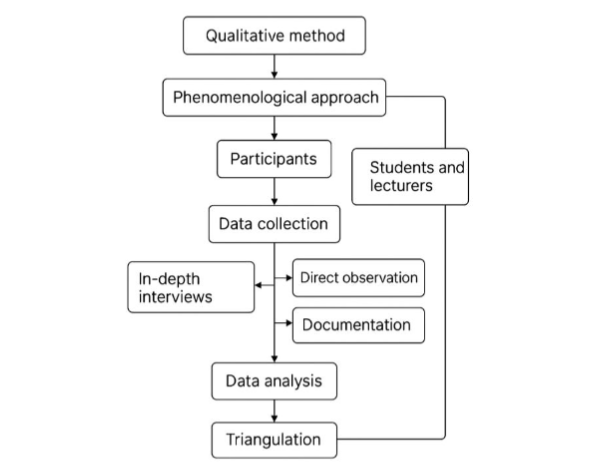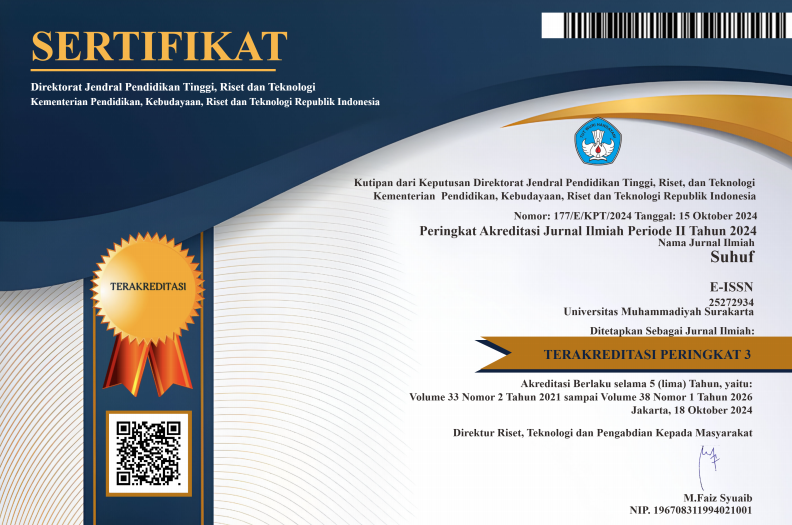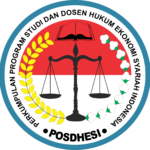Optimization Strategies for Student Scientific Publications in Islamic Higher Education Institutions to Enhance Academic Competence Based on Outcome-Based Education (OBE)
DOI:
https://doi.org/10.23917/suhuf.v37i1.10020Keywords:
Tri dharma of higher education, Student academic culture, Incentive strategies, Academic productivity, Outcome-based educationAbstract
Higher education demands that students not only master knowledge but also actualize their ideas through scientific works, including journal article publications. However, low literacy interest, lack of writing skills, and limited understanding of the publication process present major student challenges. This study aims to examine and develop innovative strategies to enhance students' scientific writing skills as an alternative to thesis writing to support the achievement of the Tri Dharma of Higher Education, particularly in accredited scientific publications. This research uses a qualitative approach with a phenomenological method, conducted through interviews, observations, and documentation. Data analysis was done through data reduction, data presentation, and conclusion drawing, employing triangulation of techniques and sources. The results show that journal publication plays a strategic role in shaping students' academic culture. However, challenges such as low literacy, lack of mentoring, and low motivation remain significant barriers. Study programs have implemented writing workshops, intensive mentoring, incentive provision, and hands-on writing practice to encourage student productivity. It can be concluded that strategies based on active practice, lecturer-student collaboration, and support through facilities and incentives effectively improve the quality of students' journal publications. The implementation of these strategies not only improves students' writing skills but also strengthens a productive and collaborative academic culture within higher education institutions. Furthermore, this approach accelerates the achievement of the Tri Dharma of Higher Education, particularly in research and scientific publications.
Downloads
References
[1] J. Z. Hafizd, “Implementasi Peran Mahasiswa Sebagai Agent Of Change Melalui Karya Tulis Ilmiah [The Implementation of the Role of Students as Agents of Change Through Scientific Writing],” Dimasejati J. Pengabdi. Kpd. Masy., vol. 4, no. 2, pp. 175–184, (in Indonesia), 2022, doi: http://dx.doi.org/10.24235/dimasejati.v4i2.12036.
[2] U. Khasanah, V. B. Mahendra, P. Studi, H. Keluarga, P. Studi, and P. Agama, “Peningkatan Luaran Pembelajaran untuk Mendukung Publikasi Dosen dan Mahasiswa [Improving Learning Outcomes to Support Faculty and Student Publications],” J. Indones. Mengabdi, vol. 2, no. 1, pp. 8–15, (in Indonesia), 2023, doi: https://doi.org/10.55080/jim.v2i1.74.
[3] E. Pakpahan, M. Yunita, N. Lubis, R. Bangun, and S. P. R. Manalu, “Pelatihan Meningkatkan Peran Mahasiswa dalam Memajukan Luaran Karya Ilmiah [Training to Enhance the Role of Students in Advancing Scientific Work Outputs],” J. Pengabdi. Masy. Tjut Nyak Dhien, vol. 2, no. 1, pp. 99–107, (in Indonesia), 2023, doi: https://doi.org/10.36490/jpmtnd.v2i1.557.
[4] R. S. Rodliyah and A. Khoirunnisa, “The effect of journal writing on students’ writing ability and self-efficacy,” Indones. J. Teach. English as a Foreign Lang., vol. 1, no. 1, pp. 19–29, 2023, [Online]. Available: https://ejournal.upi.edu/index.php/ijtefl/article/view/56531
[5] J. Warlizasusi, I. Ifnaldi, N. Nuzuar, A. Qodri, and H. S. Utami, “Developing Academic Writing Learning Module to Improve Writing Skills of Graduate Program Students,” Ta’dib, vol. 26, no. 2, pp. 391–404, 2023, doi: http://dx.doi.org/10.31958/jt.v26i2.10496.
[6] A. N. Izi, F. N. Anggraini, R. Regita, and R. Rabiatuladawiyah, “A Development of the Turnitin System in Improving Plagiarism Detection for Islamic Religious Education Studies,” Suhuf Int. J. Islam. Stud., vol. 36, no. 2, pp. 216–226, Nov. 2024, doi: https://doi.org/10.23917/suhuf.v36i2.6275.
[7] M. Heriyudananta, “Analisis Kompetensi Menulis Karya Tulis Ilmiah Mahasiswa di Indonesia,” Ascarya J. Islam. Sci. Cult. Soc. Stud., vol. 1, no. 1, pp. 47–55, (in Indonesia), 2021, doi: https://doi.org/10.53754/iscs.v1i1.5.
[8] L. Pramesti, A. Gafur, and R. Ibrahim, “Pelatihan penulisan karya ilmiah pada mahasiswa TPK untuk terampil dan kreatif menulis [Training on Scientific Writing for TPK Students to Develop Skills and Creativity in Writing],” J. Pengabdi. Kpd. Masy. Nusant., vol. 4, no. 3, pp. 2293–2298, (in Indonesia), 2023.
[9] S. Ariyanto, W. Cahyadi, and A. Nugraha, “Strategi Penulisan Artikel Ilmiah untuk Lolos Publikasi Jurnal Terakreditasi SINTA bagi Mahasiswa Bidang Teknik [Strategies for Writing Scientific Articles to Successfully Publish in SINTA Accredited Journals for Engineering Students],” Madiun Spoor J. Pengabdi. Masy., vol. 3, no. 2, pp. 47–51, (in Indonesia), 2023, doi: https://doi.org/10.37367/jpm.v3i2.319.
[10] R. Megawati and M. Damayanti, “Peran Dosen Pembimbing Skripsi dalam Proses Penyelesaian Tugas Akhir Mahasiswa [The Role of Thesis Supervisors in the Process of Completing Students’ Final Projects],” J-HEST J. Heal. Educ. Econ. Sci. Technol., vol. 4, no. 1, pp. 33–39, (in Indonesia), 2021, doi: http://dx.doi.org/10.36339/jhest.v4i1.63.
[11] A. Nasir, N. Nurjana, K. Shah, R. A. Sirodj, and M. W. Afgani, “Pendekatan fenomenologi dalam penelitian kualitatif [Phenomenological Approach in Qualitative Research],” Innov. J. Soc. Sci. Res., vol. 3, no. 5, pp. 4445–4451, (in Indonesia), 2023, [Online]. Available: https://j-innovative.org/index.php/Innovative/article/view/5224
[12] D. Assyakurrohim, D. Ikhram, R. A. Sirodj, and M. W. Afgani, “Metode Studi Kasus dalam Penelitian Kualitatif [Case Study Method in Qualitative Research ],” J. Pendidik. Sains Dan Komput., vol. 3, no. 01, pp. 1–9, (in Indonesia), 2022, doi: https://doi.org/10.47709/jpsk.v3i01.1951.
[13] W. V. Nurfajriani, M. W. Ilhami, A. Mahendra, M. W. Afgani, and R. A. Sirodj, “Triangulasi Data Dalam Analisis Data Kualitatif [Data Triangulation in Qualitative Data Analysis ],” J. Ilm. Wahana Pendidik., vol. 10, no. 17, pp. 826–833, (in Indonesia), 2024, doi: https://doi.org/10.5281/zenodo.13929272.
[14] H. Hamdan, “Peran Pendidikan Kewirausahaan di Perguruan Tinggi dalam Meningkatkan Daya Saing Mahasiswa dalam Memasuki Dunia Kerja [The Role of Entrepreneurship Education in Higher Education in Enhancing Students’ Competitiveness in Entering the Workforce],” J. Pendidik. dan Kewirausahaan, vol. 12, no. 2, pp. 734–749, (in Indonesia), 2024, doi: https://doi.org/10.47668/pkwu.v12i2.1310.
[15] A. S. Menício, L. Pais, and T. Ferraro, “The Role of Knowledge Sharing in Achieving the UN’s 2030 Agenda for Sustainable Development Goals and Sustainability: A Systematic Literature Review,” Int. J. Knowl. Manag. Stud., vol. 15, no. 3, pp. 263–293, 2024, doi: https://doi.org/10.1504/IJKMS.2024.142716.
[16] S. Suratni et al., “Pelatihan Keterampilan Menulis Ilmiah bagi Mahasiswa Semester Akhir [Scientific Writing Skills Training for Final Year Students ],” ARDHI J. Pengabdi. Dalam Negri, vol. 3, no. 2, pp. 14–23, (in Indonesia), 2025, doi: https://doi.org/10.61132/ardhi.v3i2.1092.
[17] A. D. Fitriana, I. Mutmainnah, and S. Halifah, “Penyelenggaraan Tridharma Perguruan Tinggi Sesuai Bidang Keilmuan Sebagai Upaya Personal Branding Dosen [Implementation of the Tridharma of Higher Education According to Academic Fields as an Effort for Faculty Personal Branding],” KOMUNIDA, vol. 11, no. 02, pp. 195–215, (in Indonesia), 2021, doi: https://doi.org/10.35905/komunida.v11i02.2111.
[18] M. Huda, “Peran Guru Pendidikan Agama Islam Dalam Mengembangkan Pendidikan Multikultural [The Role of Islamic Religious Education Teachers in Developing Multicultural Education],” J. Kaji. Pendidik. Islam, vol. 1, no. 1, pp. 70–90, (in Indonesia), 2022, doi: http://dx.doi.org/10.58561/jkpi.v1i1.7.
[19] H. Haedariah, A. Anas, L. Arofah, and R. Pujiastutik, “Minat Baca Mahasiswa Fakultas Keguruan dan Ilmu Pendidikan Program Studi Pendidikan Bahasa dan Sastra Indonesia Universitas Lakidende [Reading Interest of Students of the Faculty of Teacher Training and Education, Indonesian Language and Literature Educat,” J. Rev. Pendidik. Dan Pengajaran, vol. 6, no. 3, pp. 59–66, (in Indonesia), 2023, doi: https://doi.org/10.31004/jrpp.v6i3.18659.
[20] A. Akbar, “Minat Literasi Mahasiswa [Literacy Interest of Students],” Nat. J. Kaji. Penelit. Pendidik. Dan Pembelajaran, vol. 4, no. 2b, pp. 593–596, (in Indonesia), 2020, [Online]. Available: https://d1wqtxts1xzle7.cloudfront.net/110043052/420-libre.pdf?1704404508=&response-content-disposition=inline%3B+filename%3DMinat_Literasi_Mahasiswa.pdf&Expires=1747281888&Signature=H0VPzlKYjuQNT8orZiz2n9TDl4L3757u6X5ven7F2Q4vJGF-GgGpCjd2u7gw8nuZAbwc6d8jK9mihPswdXmg-bIkNeJbgNE90em6-j4HJlEF48lBxwmPYKeOvYsjUG-MjuiObtcsoGlK3Wpc4jOVGMVKDoyLeOkoJpzfW4NvG9laQXmeQbx-adWiGwknxPBwWCztNgb~WPp5~Tmjg6befBwJLh1jMMm1hXrT4Czqk8ECd94k4WBg9Lq8ag~paUBM6jzt1GFp1i2m3wx403bTF6AD3HF5Jgnu6GCKAuckXBuOeMYzi4~Vdp-JGmftZOFsjG3mMxjFoWYaFu-~AeSJsQ__&Key-Pair-Id=APKAJLOHF5GGSLRBV4ZA
[21] F. A. Rosyida, K. Hanifah, M. S. Latif, and M. Abidin, “Strategi Mahasiswa dalam Penyusunan Karya Tulis Ilmiah di Pascasarjana UIN Malang [Students’ Strategies in Writing Scientific Papers at the Graduate School of UIN Malang],” J. Educ. Res., vol. 5, no. 2, pp. 1312–2301, (in Indonesia), 2024, doi: https://doi.org/10.37985/jer.v5i2.998.
[22] E. Ermalianti, Y. Yansyah, M. Istati, H. Fadilah, and N. Rahmi, “Penguatan kemampuan menulis ilmiah mahasiswa dengan pelatihan menulis berbasis teks mentor [Strengthening Students’ Scientific Writing Skills through Mentor-Based Text Writing Training],” J. Anugerah J. Pengabdi. Kpd. Masy. Bid. Kegur. dan Ilmu Pendidik., vol. 6, no. 2, pp. 201–212, (in Indonesia), 2024, doi: https://doi.org/10.31629/anugerah.v6i2.7007.
[23] D. D. A. B. Kaban, T. S. B. Sembiring, N. Hasibuan, and S. Syahrial, “Pengaruh Mata Kuliah Metodologi Penelitian terhadap Karya Tulis Ilmiah Mahasiswa PGSD Stambuk 2022 Universitas Negeri Medan [The Impact of Research Methodology Course on Scientific Writing of PGSD Students, Class of 2022, University of Negeri Medan],” Edukasi Elit. J. Inov. Pendidik., vol. 2, no. 2, pp. 173–184, (in Indonesia), 2025, doi: https://doi.org/10.62383/edukasi.v2i2.1422.
[24] S. Fauziah, K. Khairuna, and R. Reflina, “Development of LKPD Based on Discovery Learning on Human Respiratory System Material to Train Skills Student Critical Thinking,” J. Teknol. Pendidik. J. Penelit. dan Pengemb. Pembelajaran, vol. 8, no. 4, pp. 813–821, 2023, doi: http://dx.doi.org/10.33394/jtp.v8i4.8877.
[25] M. Mustaqim, M. H. Fahmi, and L. A. Setiyaningsih, “Intensitas, Kualitas, Derajat Relevansi Supervisi Akademik Dalam Meningkatkan Kinerja Guru Madrasah Di Era Teknologi Komunikasi [The Intensity, Quality, and Relevance of Academic Supervision in Improving the Performance of Madrasah Teachers in the Era of ,” Tadbir J. Stud. Manaj. Pendidik., vol. 4, no. 2, pp. 233–254, (in Indonesia), 2020, doi: http://dx.doi.org/10.29240/jsmp.v4i2.2015.
[26] I. M. C. Wibawa, “Improving Student Science Learning Outcomes Through Cooperative Learning: Early Childhood Students Through Small Groups,” Indones. J. Educ. Dev., vol. 4, no. 1, pp. 118–125, 2023, doi: https://doi.org/10.59672/ijed.v4i1.2886.
[27] D. M. W. Yusana, “Improving Teachers’ Ability to Develop Independent Curriculum Teaching Modules Through Training by School Supervisors at SMK Negeri 3 Tabanan,” Indones. J. Educ. Dev., vol. 4, no. 1, pp. 110–117, 2023, doi: https://doi.org/10.59672/ijed.v4i1.2874.
[28] D. Nuraeni, Nurkolis, and I Made Sudana, “Manajemen Pendidikan Karakter dalam Implementasi Proyek Penguatan Profil Pelajar Pancasila di SMP Negeri 1 Kertek Kabupaten Wonosobo [Character Education Management in the Implementation of the Strengthening Pancasila Student Profile Project at SMP Negeri,” Didakt. J. Ilm. PGSD STKIP Subang, vol. 10, no. 1 SE-Articles, pp. 1144–1156, (in Indonesia), Feb. 2024, doi: https://doi.org/10.36989/didaktik.v10i1.2570.
[29] R. Arifa and P. Agustini, “Peran Kurikulum Dalam Meningkatkan Mutu Pendidikan [The Role of Curriculum in Improving the Quality of Education],” J. Multidisiplin Ilmu Akad., vol. 2, no. 1, pp. 595–600, (in Indonesia), 2025, doi: https://doi.org/10.61722/jmia.v2i1.3613.
[30] W. W. A. Winarto, “Program peningkatan minat menulis karya tulis ilmiah mahasiswa [Program to Enhance Students’ Interest in Writing Scientific Papers],” J. Altifani Penelit. Dan Pengabdi. Kpd. Masy., vol. 1, no. 1, pp. 22–26, (in Indonesia), 2021, doi: https://doi.org/10.25008/altifani.v1i1.114.
[31] R. H. Susanti, “Penulisan Karya Ilmiah sebagai Salah Satu Tools Meningkatkan Kemampuan Berpikir Kritis [Scientific Writing as a Tool to Enhance Critical Thinking Skills],” J. Inov. Edukasi, vol. 6, no. 1, pp. 1–11, 2023, doi: https://doi.org/10.31219/osf.io/qw4vk.
[32] I. D. A. M. Budhyani and M. D. Angendari, “Kesulitan dalam menulis karya ilmiah [Difficulties in Writing Scientific Papers],” Mimb. Ilmu, vol. 26, no. 3, pp. 400–407, (in Indonesia), 2021, doi: https://doi.org/10.23887/mi.v26i3.40678.

Downloads
Submitted
Accepted
Published
How to Cite
Issue
Section
License
Copyright (c) 2025 Abil Fida Muhammad Qois Al Hadi, Fadhilla Nangroe Anggraini Anggraini , Linda Asmara, Latifah Insani Muslimah Murni, Muhammad Fathi Salim

This work is licensed under a Creative Commons Attribution 4.0 International License.


















